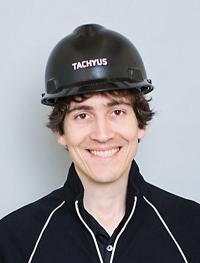The Startup Founder
Spring
2016
Spotlight on Hidden Physicists
The Startup Founder
Francisco LePort, Founder and Head of Research, Data Physics, and Hardware at Tachyus
By:Francisco LePort, Founder and Head of Research, Data Physics, and Hardware at Tachyus Sigma Pi Sigma University of California, Irvine Chapter, Class of 2002
 I’ve always had two interests: building things and understanding how things work at a fundamental level. Growing up I wanted to be an inventor (whatever that meant to a 5-year-old!), but when I discovered physics I fell in love. After earning my bachelor’s degree at the University of California, Irvine, I went for a PhD in experimental particle physics at Stanford University.
I’ve always had two interests: building things and understanding how things work at a fundamental level. Growing up I wanted to be an inventor (whatever that meant to a 5-year-old!), but when I discovered physics I fell in love. After earning my bachelor’s degree at the University of California, Irvine, I went for a PhD in experimental particle physics at Stanford University.
Building a very complex experimental apparatus to study the fundamental physics of neutrinos was extremely exciting. I learned a great deal and enjoyed my time at Stanford immensely, but toward the end of my PhD I began to feel that there was an aspect of my interests not being satisfied. Being at the center of Silicon Valley had gotten me interested in business.
Then Tesla Motors went public with its first initial public offering the summer before I graduated. My advisor was acquainted with the CFO. I applied to the company and got a job in battery R&D, though they admitted they were taking as much of a gamble as I was. I didn’t know anything but academia, and they didn’t know exactly what to expect from a physics PhD.
The gamble paid off. I contributed to core technology, and I learned a tremendous amount about running a successful Silicon Valley startup. I even hung out with Elon Musk. After 2.5 years I was ready to move closer to starting my own company and joined a very early-stage stealth startup as employee number eight. Unfortunately, that startup didn’t work out, but it left me in a great place to found my own company.
Throughout my graduate studies and time in industry, a common theme of my work has been looking at large data sets obtained from a physical system—whether a neutrino detector or a car battery—through the lens of physics. I developed a unique set of methods that allowed me to extract useful information quickly from such data sets. Interestingly, I haven’t needed specific experience in any of the disparate areas in which I’ve worked to make progress quickly. This is because of what I learned while running the experiment I worked on at Stanford, which required me to be flexible in dealing with different kinds of data.
Now I have brought my methodology to Tachyus, where I am a cofounder and leading research. At Tachyus we have developed a novel approach to optimize oil and gas energy production. We call it “Data Physics,” and it has been very successful. The company is young. We have an enormous amount of research to do and an enormous amount of software to build. I credit our success so far in large part to the skills I learned as a physics PhD, which continue to help me develop unique solutions to unsolved problems.
